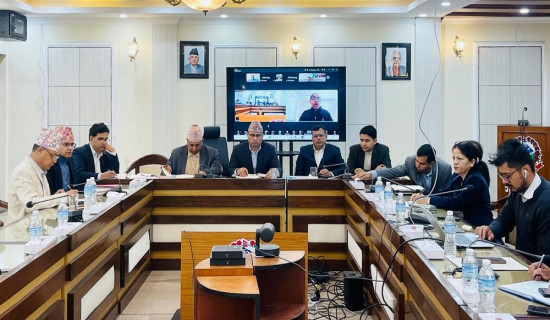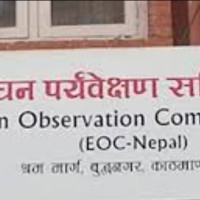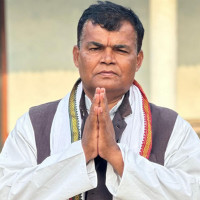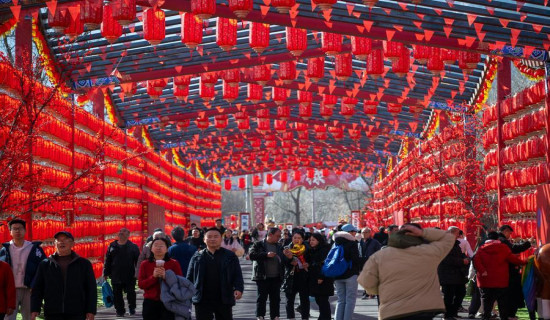- Wednesday, 4 March 2026
Pandemic Leftovers On Chepang Community
With a focus on post-pandemic narratives, insights from my ethnographic fieldwork consider the ways in which the post-pandemic situation is shaped by individual and collective experiences of agency, belonging, and community. The fieldwork was in the Chepang or Praja community in Chainpur of Raksirang Rural Municipality in Makwanpur, which is largely known as a socio-culturally marginalised indigenous community for ages. My fieldwork largely aimed to explore how they experienced the COVID-19 pandemic, and the pandemic leftovers have changed their socio-cultural and political life.
It was a rainy day in the first week of July, 2024. I started my ethnographic fieldwork in Chainpur of Raksirang. In the beginning, I had lots of curiosities about how these indigenous people in the locality thought about the pandemic, their embodied experiences in everyday life, and coping mechanisms. It was interesting to explore not only their interest and motivations in accessing essential health care services, including vaccines, but also to understand their health and illness narratives from social, cultural, and religious perspectives.
On the muddy road to Raksirang from Manahari on the highway, the heavy rain made me nervous for a while. Looking around, I met Subina Praja, in her 20s, on the way walking to Raksirang. She was working for a local community organisation that was devoted to empowering Chepang communities for their sustainable livelihoods. After a brief introductory conversation, I wondered whether I could start talking about how Chepangs faced the unfortunate experiences of the pandemic, whom they shared their concerns with, and how they coped with countless fears and uncertainties of life or death everywhere.
Sabina shared briefly, “Public health awareness is very limited among Chepangs in rural areas. Many of them still hesitate to visit health facilities for care. Even during the pandemic, some families did not take vaccines or wish for other counselling and care in health facilities. Rather, they still preferred traditional healings with their religious leaders or shamans. In case of serious medical complications, they attempted to visit local health facilities.”
In everyday life, shamanism exists in different variations, and they share common beliefs that spirits exist (good or evil) and that they can communicate with the spirits. People still believe that they can usually cure sickness caused by evil spirits. Such perceptions, beliefs, and cultural norms are still deeply rooted in the minds and social life of the Chepang communities.
Tek Bahadur Sunar, 76, is a local traditional healer who migrated to Chainpur 20 years ago from the rural hill of Raksirang. He observes that things have now changed in terms of access to health care, access to transport, and infrastructure. Earlier, many people used to rely on traditional or spiritual healings. As soon as the local health post was established in the nearby village, people now preferred to visit health facilities for health care. During the pandemic, some people visited him for traditional or spiritual healings.
While there were so many curiosities and anxieties about the pandemic and issue of life and death, the Chepangs and some other ethnic communities, such as Tamangs and Dalits—so-called untouchable castes—initially relied on their religious beliefs and prayers for prevention, care, and recovery from the pandemic.
However, Tek Bahadur and his family went to the health post for the vaccine, but some of the Chepang families from rural communities hesitated to take vaccines or counselling at the health facilities. Growing fears and their beliefs reveal that vaccines harm their bodies with serious side effects. Interestingly, for some of them, the vaccine was no longer a priority.
An old woman, 80 years old in Chainpur, Raksirang, said, “We are old now and do not need any care for COVID-19 vaccines. I have never taken any medical care yet—so why for the COVID-19 vaccine? We do not move out, so we are socially and culturally protected, and my religion, as I pray, is the best care for me.”
She added further, “Younger ones can go to health facilities for vaccines or other care related to their health or illness. While I saw my neighbours going for vaccines and using masks, we do not need it, as we never did in the past. Rather, I take the help of religious leaders and their praying or spiritual healing that makes us feel better and safer.”
Thus, health is largely a socio-culturally constructed and embodied experience. Moreover, this provides insightful anthropological evidence on the cultural understanding of the pandemic and the ways people think about their health and illness. The religious beliefs, cultural norms, and their pandemic leftovers are not transformed yet in the post-modern societies.
While visiting one of the households, I met a Chepang man at the age of 48 who was ready for walking to a local market for work. I approached him with my general curiosity: “Did you take vaccines for COVID-19?” He was pleasantly surprised and said, “No, never.” I again asked, Why?
With some doubts and confusion, he said, “I have never taken any vaccines. Nor did my family members and children. It is dangerous and has side effects, so I am afraid and do not want vaccination anymore. This may be good for other families, meaning those with relatively high socio-economic status.”
This reveals that human behaviour is shaped by unconscious patterns and structures that are largely beyond our control. It is interesting to understand how humans make sense of their social world around them. The underlying social structures and patterns are shaping their beliefs, values, and behaviours.
During the fieldwork, I tried to explore the social, cultural, and religious context of the post-pandemic and examine how religious beliefs, practices, and institutions shape people’s lives, social interactions, and cultural expressions. The social norms, traditions, and cultural values have shaped the coping mechanisms of the pandemic and leftovers. And the ways in which the communities interact and build the agency, social solidarity, and belongingness in the larger context of changing societies in the modern world.
It is said that religion serves as a means for creating social solidarity that reflects the values and beliefs of a particular society. In the post-pandemic, the leftovers were visibly noted. The social sufferings from worse health consequences of the pandemic were further fuelled by social distancing, loneliness, low mobility, fears, loss of jobs, economic tensions, and poor mental health conditions.
A mother of three children in the locality remarked, “We learnt many lessons from the pandemic. From household sanitation and personal hygiene to health care seeking in the hospital, we are more conscious of our own health and illness.” Again, some Chepangs are becoming more socialised after the pandemic. They have realised the value of social capital, networking, and social solidarity in responding to the pandemic.
A health worker who belongs to the Chepang community and is working in the hospital said, “Some people suffered from the pandemic badly, and some families lost their loved ones. They have realised the social consequences of the pandemic. The pandemic leftovers are largely embodied experiences of unbelievable social tragedy, sufferings, and adaptive wisdoms.”
The humanitarian context of the pandemic cannot be ignored, as it is an issue of life or death for many. Thus, the narrative analysis of telling and retelling the stories opens up new perspectives on the post-pandemic experiences of the communities in terms of silences, collective consciousness, religious, and indigenous practices to heal the social sufferings at large.
(Bhandari is a health policy analyst and has an interest in anthropology.)



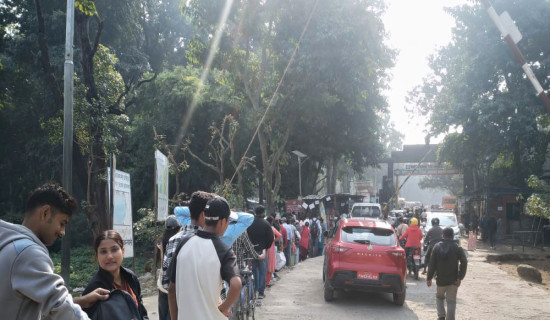
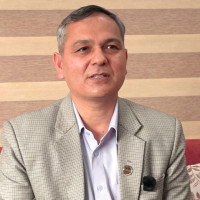
-square-thumb.jpg)
